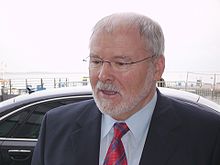- Harald Ringstorff
-
Harald Ringstorff 
Prime Minister of Mecklenburg-Vorpommern In office
3 November 1998 – 6 October 2008Preceded by Bernd Seite Succeeded by Erwin Sellering Minister of Justice of Mecklenburg-Vorpommern In office
3 November 1998 – 19 September 2000Prime Minister Harald Ringstorff Preceded by Rolf Eggert Succeeded by Erwin Sellering Minister of Economics and Affairs of European Union of Mecklenburg-Vorpommern In office
8 December 1994 – 6 May 1996Prime Minister Bernd Seite Preceded by Herbert Helmrich (Affairs of European Union)
Conrad-Michael Lehment (Economics)Succeeded by Rolf Eggert (Affairs of European Union)
Jürgen Seidel (Economics)Vice Prime Minister of Mecklenburg-Vorpommern In office
8 December 1994 – 6 May 1996Prime Minister Bernd Seite Preceded by Klaus Gollert Succeeded by Hinrich Kuessner President of Federal Council In office
1. November 2006 – 31. Oktober 2007President Horst Köhler Chancellor Angela Merkel Preceded by Peter Harry Carstensen Succeeded by Ole von Beust Member of the Landtag of Mecklenburg-Vorpommern Incumbent Assumed office
26 October 1990Prime Minister Alfred Gmolka (1990-1992)
Bernd Seite (1992-1998)
Harald Ringstorff (1998-2008)
Erwin Sellering (ab 2008)Member of Volkskammer In office
18 March 1990 – 2 October 1990President Manfred Gerlach
Sabine Bergmann-Pohl (acting since 6 April 1990)Prime Minister Hans Modrow
Lothar de Maizière (since 12 April 2010)Personal details Born 25 September 1939
Wittenburg, East Germany
East GermanyNationality German Political party SPD Dr. Harald Ringstorff (born September 25, 1939 in Wittenburg, Mecklenburg-Schwerin) is a German politician of the Social Democratic Party (SPD) and was minister-president of the state of Mecklenburg-Vorpommern.[1] He has been heading a coalition government of SPD and PDS (now Left Party) from 1998 until 2006, and since then was heading a coalition between SPD and CDU. He was the President of the German Bundesrat, serving for the term 2006/07.
After his Abitur and military service, Ringstorff studied Chemistry at the University of Rostock. He received his Ph.D. in 1969. Afterwards he worked as a chemist for the Rostock dockyards. From 1987 to 1990 he was director of the branch office of the VEB Kali-Chemie ("people's enterprise for potash chemistry").
In 1989 Ringstorff was a founding member of the Social Democratic Party in the GDR and a member of the freely elected Volkskammer of 1990. From 1990 to 2003 he was chairman of the SPD in Mecklenburg-Vorpommern.
Since 1990 Ringstorff has been a member of the Landtag of Mecklenburg-Vorpommern where he served as parliamentary leader of the SPD from 1990-1994 and 1996-1998. In between he was Minister for Economic and European Affairs and vice-minister-president in a coalition government with the CDU under minister-president Berndt Seite (CDU).
In 1998, the SPD agreed to form a coalition with the PDS (now Left Party), a move controversial within the party. Ringstorff was elected minister-president. His coalition government was re-elected in 2002. After the elections of 2006, he decided to switch to a coalition with the CDU, which would have a more comfortable majority in parliament.
References
- ^ Buergin, Rainer (6 August 2008). "German State of Mecklenburg Premier Ringstorff Quits, Cites Age". Bloomberg L.P.. http://www.bloomberg.com/apps/news?pid=newsarchive&sid=ajx2UayFSjbQ&refer=germany. Retrieved 23 March 2011.
Soviet administration / DDR (1945-1990)
state of Mecklenburg
Federal Republic of Germany (since 1990) Categories:- Ministers-President of Mecklenburg-Vorpommern
- 1939 births
- Living people
- People from Wittenburg
- Members of the Landtag of Mecklenburg-Vorpommern
- Social Democratic Party of Germany politicians
- People from Mecklenburg
- University of Rostock alumni
- Grand Crosses with Star and Sash of the Order of Merit of the Federal Republic of Germany
- Recipients of the Order of the Cross of Terra Mariana, 2nd Class
Wikimedia Foundation. 2010.


